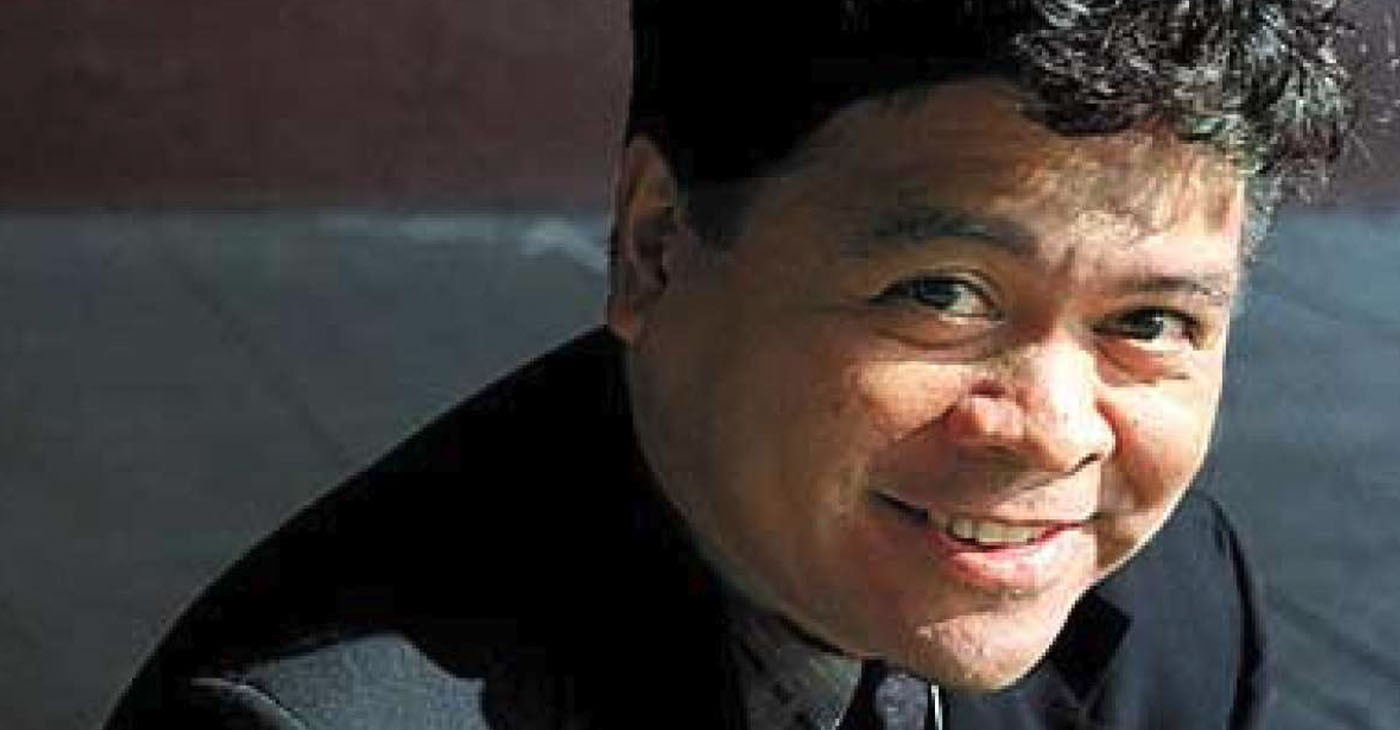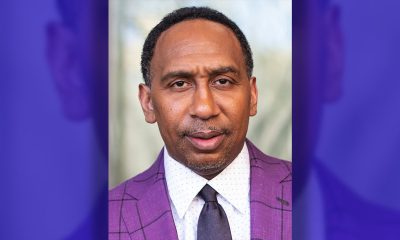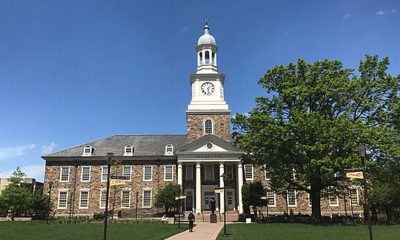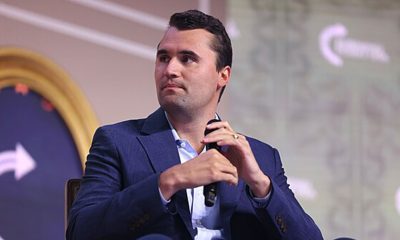Activism
COMMENTARY: Highland Park Is a Tragedy, But So Is Akron, Ohio, And Jayland Walker.
The eight officers were placed on administrative leave. And last weekend hundreds protested in downtown Akron. We just didn’t see much coverage on it. It would have only reinforced what we know—that police violence, specifically toward the BIPOC community is real and keeps happening again and again.

By Emil Guillermo
If you were celebrating on the Fourth of July, you have to be troubled on the fifth, sixth, seventh, and all the rest of our days.
This past weekend, some of our fellow Americans were flinching from gunpowder blasts. And it’s not from the fireworks.
It’s from guns. And it’s a reminder that our freedoms just don’t seem to be working right now for all of us in America.
We may have to think seriously about giving up some rights for the greater good.
It surely can’t go on much longer the way it is.
Not when seven are dead and more than 30 are injured when a gunman shot up a Fourth of July parade in Highland Park, Ill.
Not when the police chief of Akron, Ohio, finally released officers’ body camera videos of the killing of Jayland Walker on Sunday, nearly a week after Akron cops put more than 60 gunshot wounds into an unarmed Walker.
The Sunday release of the body-cam footage and the NAACP-led protest that occurred over the holiday in Akron would have led the national news most weekends.
But not when you have a live shooting at a Fourth of July parade in a Chicago suburb considered one of the safest places in America.
If you don’t know Highland Park (population 30,177), it’s to Chicago what the Lamorinda area is to Oakland. Affluent ($147,067 plus median income), 80-90% white. As a “white flight” suburb, mass shootings aren’t supposed to happen there.
So, when it does, the media get super-focused on Highland Park.
Meanwhile, Akron barely got mentioned in the news. You need both instances together to give you the rich, full picture of America’s gun problem.
It’s not the same for everyone.
For people of color, we have to fear the bad guys and the good guys.
Surely, minority communities know the Highland Park kind of gun violence perpetrated by an alienated male with an AR-15 type weapon. The Black community felt the pain at the Tops Supermarket shooting in Buffalo where 10 people died in May. The Hispanic community suffered in Uvalde when 21 people were killed last month.
But then you have the kind of shooting that took Jayland Walker’s life.
Reports say Walker had a handgun on a seat in his car. It wasn’t loaded. And he didn’t use it. Walker was stopped by the Akron police during a routine traffic stop. He had one traffic ticket and no criminal record. So why did it take eight officers to stop him, ending in a seven-minute pursuit that left Walker dead?
At one point, Walker stopped, exited his car wearing a ski mask, and fled on foot. Police used tasers at first, but when that didn’t stop Walker, the officers opened fire.
Akron Chief Stephen L. Mylett confirmed Walker was unarmed when confronted and told the lawyers for Walker that evidence he’d seen, indicated the officers were not threatened.
The eight officers were placed on administrative leave. And last weekend hundreds protested in downtown Akron. We just didn’t see much coverage on it. It would have only reinforced what we know—that police violence, specifically toward the BIPOC community is real and keeps happening again and again.
Who knows if Jayland Walker and his family will ever see justice? We only know for sure that Walker won’t be the last Black man who dies by police violence.
That’s why we need to keep shining a light on Walker’s case, so that in a year people won’t wonder, “Jayland Who?”
Emil Guillermo is a veteran journalist and commentator. See his work on www.amok.com
Activism
Oakland Post: Week of December 24 – 30, 2025
The printed Weekly Edition of the Oakland Post: Week of – December 24 – 30, 2025

To enlarge your view of this issue, use the slider, magnifying glass icon or full page icon in the lower right corner of the browser window.
Activism
Lu Lu’s House is Not Just Toying Around with the Community
Wilson and Lambert will be partnering with Mayor Barbara Lee on a toy giveaway on Dec. 20. Young people, like Dremont Wilkes, age 15, will help give away toys and encourage young people to stay in school and out of trouble. Wilkes wants to go to college and become a specialist in financial aid. Sports agent Aaron Goodwin has committed to giving all eight young people from Lu Lu’s House a fully paid free ride to college, provided they keep a 3.0 grade point average and continue the program. Lu Lu’s House is not toying around.

Special to the Post
Lu Lu’s House is a 501c3 organization based in Oakland, founded by Mr. Zirl Wilson and Mr. Tracy Lambert, both previously incarcerated. After their release from jail, they wanted to change things for the better in the community — and wow, have they done that!
The duo developed housing for previously incarcerated people, calling it “Lu Lu’s House,” after Wilson’s wonderful wife. At a time when many young people were robbing, looting, and involved in shootings, Wilson and Lambert took it upon themselves to risk their lives to engage young gang members and teach them about nonviolence, safety, cleanliness, business, education, and the importance of health and longevity.
Lambert sold hats and T-shirts at the Eastmont Mall and was visited by his friend Wilson. At the mall, they witnessed gangs of young people running into the stores, stealing whatever they could get their hands on and then rushing out. Wilson tried to stop them after numerous robberies and finally called the police, who Wilson said, “did not respond.” Having been incarcerated previously, they realized that if the young people were allowed to continue to rob the stores, they could receive multiple criminal counts, which would take their case from misdemeanors to felonies, resulting in incarceration.

Lu Lu’s House traveled to Los Angeles and obtained more than 500 toys
for a Dec. 20 giveaway in partnership with Oakland Mayor Barbara
Lee. Courtesy Oakland Private Industry,
Wilson took it upon himself to follow the young people home and when he arrived at their subsidized homes, he realized the importance of trying to save the young people from violence, drug addiction, lack of self-worth, and incarceration — as well as their families from losing subsidized housing. Lambert and Wilson explained to the young men and women, ages 13-17, that there were positive options which might allow them to make money legally and stay out of jail. Wilson and Lambert decided to teach them how to wash cars and they opened a car wash in East Oakland. Oakland’s Initiative, “Keep the town clean,” involved the young people from Lu Lu’s House participating in more than eight cleanup sessions throughout Oakland. To assist with their infrastructure, Lu Lu’s House has partnered with Oakland’s Private Industry Council.
For the Christmas season, Lu Lu’s House and reformed young people (who were previously robbed) will continue to give back.
Lu Lu’s House traveled to Los Angeles and obtained more than 500 toys.
Wilson and Lambert will be partnering with Mayor Barbara Lee on a toy giveaway on Dec. 20. Young people, like Dremont Wilkes, age 15, will help give away toys and encourage young people to stay in school and out of trouble. Wilkes wants to go to college and become a specialist in financial aid. Sports agent Aaron Goodwin has committed to giving all eight young people from Lu Lu’s House a fully paid free ride to college, provided they keep a 3.0 grade point average and continue the program. Lu Lu’s House is not toying around.
Activism
Desmond Gumbs — Visionary Founder, Mentor, and Builder of Opportunity
Gumbs’ coaching and leadership journey spans from Bishop O’Dowd High School, Oakland High School, Stellar Prep High School. Over the decades, hundreds of his students have gone on to college, earning academic and athletic scholarships and developing life skills that extend well beyond sports.

Special to the Post
For more than 25 years, Desmond Gumbs has been a cornerstone of Bay Area education and athletics — not simply as a coach, but as a mentor, founder, and architect of opportunity. While recent media narratives have focused narrowly on challenges, they fail to capture the far more important truth: Gumbs’ life’s work has been dedicated to building pathways to college, character, and long-term success for hundreds of young people.
A Career Defined by Impact
Gumbs’ coaching and leadership journey spans from Bishop O’Dowd High School, Oakland High School, Stellar Prep High School. Over the decades, hundreds of his students have gone on to college, earning academic and athletic scholarships and developing life skills that extend well beyond sports.
One of his most enduring contributions is his role as founder of Stellar Prep High School, a non-traditional, mission-driven institution created to serve students who needed additional structure, belief, and opportunity. Through Stellar Prep numerous students have advanced to college — many with scholarships — demonstrating Gumbs’ deep commitment to education as the foundation for athletic and personal success.

NCAA football history was made this year when Head Coach from
Mississippi Valley State, Terrell Buckley and Head Coach Desmond
Gumbs both had starting kickers that were women. This picture was
taken after the game.
A Personal Testament to the Mission: Addison Gumbs
Perhaps no example better reflects Desmond Gumbs’ philosophy than the journey of his son, Addison Gumbs. Addison became an Army All-American, one of the highest honors in high school football — and notably, the last Army All-Americans produced by the Bay Area, alongside Najee Harris.
Both young men went on to compete at the highest levels of college football — Addison Gumbs at the University of Oklahoma, and Najee Harris at the University of Alabama — representing the Bay Area on a national level.
Building Lincoln University Athletics From the Ground Up
In 2021, Gumbs accepted one of the most difficult challenges in college athletics: launching an entire athletics department at Lincoln University in Oakland from scratch. With no established infrastructure, limited facilities, and eventually the loss of key financial aid resources, he nonetheless built opportunities where none existed.
Under his leadership, Lincoln University introduced:
- Football
- Men’s and Women’s Basketball
- Men’s and Women’s Soccer
Operating as an independent program with no capital and no conference safety net, Gumbs was forced to innovate — finding ways to sustain teams, schedule competition, and keep student-athletes enrolled and progressing toward degrees. The work was never about comfort; it was about access.
Voices That Reflect His Impact
Desmond Gumbs’ philosophy has been consistently reflected in his own published words:
- “if you have an idea, you’re 75% there the remaining 25% is actually doing it.”
- “This generation doesn’t respect the title — they respect the person.”
- “Greatness is a habit, not a moment.”
Former players and community members have echoed similar sentiments in public commentary, crediting Gumbs with teaching them leadership, accountability, confidence, and belief in themselves — lessons that outlast any single season.
Context Matters More Than Headlines
Recent articles critical of Lincoln University athletics focus on logistical and financial hardships while ignoring the reality of building a new program with limited resources in one of the most expensive regions in the country. Such narratives are ultimately harmful and incomplete, failing to recognize the courage it takes to create opportunity instead of walking away when conditions are difficult.
The real story is not about early struggles — it is about vision, resilience, and service.
A Legacy That Endures
From founding Stellar PREP High School, to sending hundreds of students to college, to producing elite athletes like Addison Gumbs, to launching Lincoln University athletics, Desmond Gumbs’ legacy is one of belief in young people and relentless commitment to opportunity.
His work cannot be reduced to headlines or records. It lives on in degrees earned, scholarships secured, leaders developed, and futures changed — across the Bay Area and beyond.
-

 #NNPA BlackPress4 weeks ago
#NNPA BlackPress4 weeks agoLIHEAP Funds Released After Weeks of Delay as States and the District Rush to Protect Households from the Cold
-

 Alameda County3 weeks ago
Alameda County3 weeks agoSeth Curry Makes Impressive Debut with the Golden State Warriors
-

 Activism4 weeks ago
Activism4 weeks agoOakland Post: Week of November 26 – December 2, 2025
-

 #NNPA BlackPress4 weeks ago
#NNPA BlackPress4 weeks agoSeven Steps to Help Your Child Build Meaningful Connections
-

 #NNPA BlackPress4 weeks ago
#NNPA BlackPress4 weeks agoSeven Steps to Help Your Child Build Meaningful Connections
-

 #NNPA BlackPress4 weeks ago
#NNPA BlackPress4 weeks agoTrinidad and Tobago – Prime Minister Confirms U.S. Marines Working on Tobago Radar System
-

 #NNPA BlackPress4 weeks ago
#NNPA BlackPress4 weeks agoThanksgiving Celebrated Across the Tri-State
-

 #NNPA BlackPress4 weeks ago
#NNPA BlackPress4 weeks agoTeens Reject Today’s News as Trump Intensifies His Assault on the Press



















































